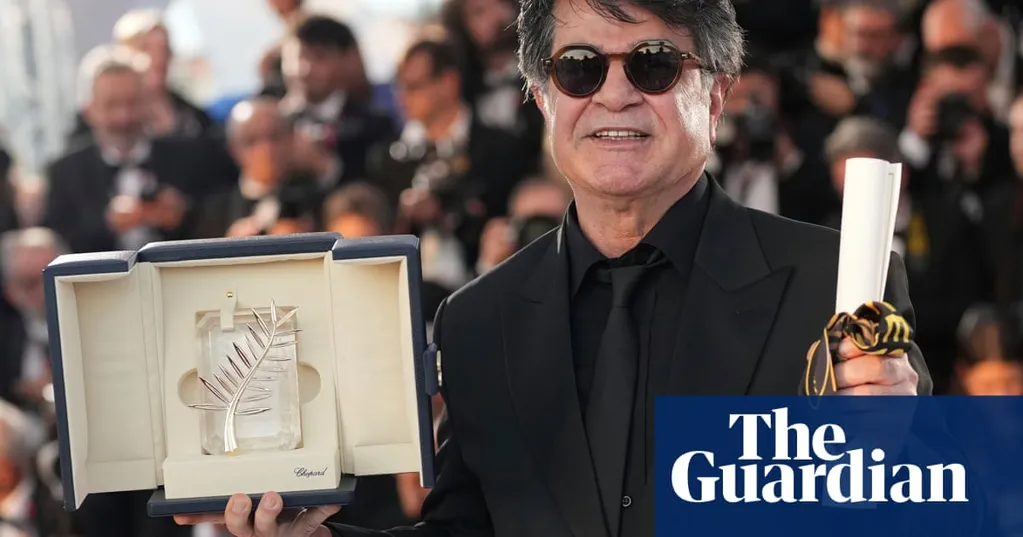The dissident Iranian film-maker Jafar Panahi has won the top prize at the Cannes film festival for his drama It Was Just an Accident, inspired by his stints of imprisonment at the hands of the Iranian government.
The film was the first in many years made by the director after a ban on film-making was lifted - although he has continued to direct despite being expressly forbidden to do so. In 2011, a year after his first arrest, a copy of his drama This Is Not a Film was snuck into Cannes on a USB stick hidden in a cake.
It Was Just an Accident is his most personal drama to date, following five characters who believe they have identified the person who anonymously tortured them in prison.
"The first time I was in prison I was in solitary confinement," Panahi said last week.
"I was on my own in a tiny cell and they would take me out blindfolded to a place where I would sit in front of a wall and hear this voice at my back. It was the voice of the man who would question me - sometimes for two hours, sometimes for eight hours.
"And I would just hang on his voice all that time, fantasising about who this person was from his voice. And I had an intuition that someday this voice would be an aspect of something I'd write or shoot and give a creative life to."
The victory means a remarkable sixth consecutive win for US studio Neon, following its triumphs for Anora, Anatomy of a Fall, Triangle of Sadness, Titane and Parasite - the first and last of which went on to sweep the board at the Oscars.
Second prize - the Grand Prix - went to Joachim Trier's domestic drama Sentimental Value, which stars Stellan Skarsgård as a tricky film-maker who attempts to reconcile with his daughter after years of estrangement by casting her in a new, highly personal film.
The film is a reunion for Trier and Renate Reinsve, who starred in his 2021 hit, The Worst Person in the World.
Meanwhile the jury - or third - prize was a tie between the Spanish director Olivier Laxe's Sirat and the German director Mascha Schilinski's Sound of Falling. The director Hasan Hadi won the first film prize - the Camera d'Or - for The President's Cake, the first award ever given to an Iraqi film in Cannes.
Best actor honours went to Wagner Moura for The Secret Agent, which also won the best director prize for Kleber Mendonça Filho, while The Little Sister's star, Nadia Melliti, took best actress.
The special prize was presented at the start of the ceremony by the jury president, Juliette Binoche, to the Chinese director Bi Gan for his trippy meditation on the death of the universe, Resurrection. The Dardennes brothers won best screenplay for The Young Mother's Home.
Binoche's majority female jury also included the Italian actor Alba Rohrwacher; Indian director Payal Kapadia; French-Moroccan writer Leïla Slimani; American actors Halle Berry and Jeremy Strong; South Korean film-maker Hong Sangsoo; Mexican director Carlos Reygadas; Congolese film-maker Dieudo Hamadi.
The festival was marked by real-world drama, from the sentencing of one of its former lions, Gerard Derardieu, on sexual assault charges on the first day of the festival, to almost-daily diatribes against Donald Trump's movie tariffs plan by film-makers including Wes Anderson, Robert De Niro and Richard Linklater.
The festival also saw a controversial gala honouring Kevin Spacey, a delegate injured by a falling palm tree, and the banning from the red carpet of an actor accused of rape. On the final day, a power cut believed by many to be sabotage hit the festival headquarters for five hours; the closing ceremony proceeded regardless thanks to backup generators.
- Un Certain Regard Award: The Mysterious Gaze of the Flamingo, Diego Céspedes
- Society of Dramatic Authors and Composers Prize: Wild Foxes, Valéry Carnoy
- Society of Dramatic Authors and Composers Prize: Guillermo Galoe and Victor Alonso-Berbel, Sleepless City
